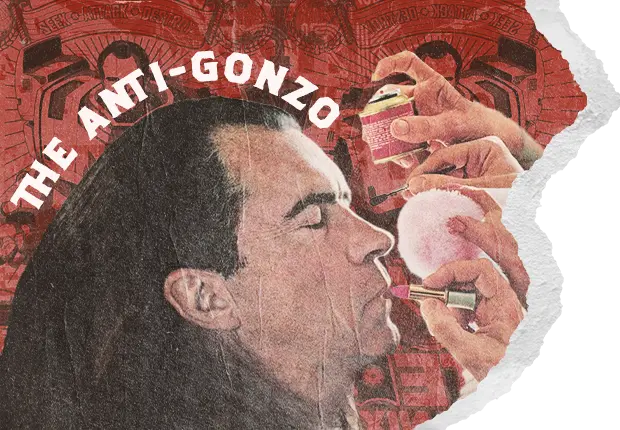The Anti-Gonzo
“Richard Nixon has never been one of my favorite people, anyway. For years I’ve regarded his very existence as a monument to all the rancid genes and broken chromosomes that corrupt the possibilities of the American Dream; he was a foul caricature of himself, a man with no soul, no inner convictions, with the integrity of a hyena and the style of a poison toad…”
— Hunter S. Thompson, 1968
Richard M. Nixon, the 37th president of the United States of America, is the butt of a joke and a demonic force that represents everything evil in the American conservative right. He is portrayed as the anti-hippy, the stodgy old man upset with the youth’s music and alternative lifestyles. There is no good mention of him in the mainstream. Some serious political thinkers will acknowledge his intellect but feel the need to couch that with an additional degrading comment. Very few people are willing to say, “I like Dick.” But despite all the criticism, Nixon was an unrivaled force that Americans have not seen since.
While Americans have their lists of good and bad presidents, Nixon is a wild card. He was never given a fair shake by the media, portrayed as cold, inhumane, and outright unlikeable. His real hostility was a response to what journalists were doing to him, not the other way round. As they all attacked, it only made sense that Nixon would hit back. Hunter S. Thompson saw him as a figure representing the evil path that America was going down—American Fascism was Nixonian. Timothy Denevi’s biography of part of Thompson’s life, Freak Kingdom: Hunter S. Thompson’s Manic Ten-Year Crusade Against American Fascism, tells how the left saw Nixon. As the title says, it was a ten-year crusade—and this crusade was against Nixon.
Nixon’s political career was marked with soaring highs and terrible lows. He performed outstanding service as a young Senator and as Eisenhower’s V.P., making the position one of significance instead of the stand-around do-nothing it was prior. He lost a presidential campaign against the young J.F.K. and a bid for the governorship of California—only to disappear, saying, “Just think about how much you’re going to be missing. You won’t have Nixon to kick around anymore because, gentlemen this is my last press conference and it will be one in which…I have welcomed the opportunity to test wits with you.” But the hatred for Nixon lies with his earlier career, specifically with Alger Hiss and the communist infiltration of America. This was his debut in the political spotlight.
Hiss was accused of being a communist spy, working for Moscow, and Nixon, serving on the House Un-American Activities Committee, fought not only the media but the White House to prove it. As Nixon related in his memoirs, when President Truman was asked about the fledgling case against Hiss, he agreed with reporters that it was a red herring, a distraction so Americans did not focus on the rising inflation at the time. Truman is quoted as saying about the investigation, “[The case was] doing irreparable harm to certain people, seriously impairing the morale of federal employees, and undermining public confidence in the government.”
Revealing how little has changed in political reporting, Hiss was widely defended by liberal papers, the same that exist today, and condemned by the now nonexistent conservative-leaning papers. Nixon also related the deep politicization in law as he repeated Truman’s condemnation of the investigation and trial, saying, “His [Truman’s] public statements, and executive orders, doing everything in his power to obstruct it.” But despite the liberal establishments’ drive to stop the case, Hiss was convicted, revealing that there was but another communist infiltrator in the American government. Despite all this, it was not accepted by liberal reporters, or as Nixon said, “They turned their anger and frustration towards me, as if I were somehow responsible for the fact that Hiss had them in.” This brought Nixon to controversial political fame and put him on the road to becoming Vice President.
The controversy and crusade against the Hiss trial by so many opinion-makers in America shaped how Nixon felt after losing the gubernatorial election in 1962. “For 16 years, ever since the Hiss case, you have had a lot of fun, a lot of fun that you had an opportunity to attack me, and I think I have given as good as I have taken.” The largest newspapers and most famous reporters had been fighting Nixon the whole time, creating the image that Hunter S. Thompson so colorfully described. But Nixon was not done. He was going to come back and fight nobly against the same forces bent on destroying him—this time as president of the United States.
This period of the Nixon Presidency is one of America’s most violent, most divided chaotic moments. While the likes of Hiss were gone, the new left was more outspoken and powerful. They had unbridled support from anyone who wanted to be “cool” or in the “movement.” Nixon represented the opposite, the “anti-gonzo,” and the fascist fighting against freak-power. He would name his constituents “the silent majority”—the large portion of Americans staunchly against what was going on around them, even if they didn’t shout loudly about it.
The power of the anti-Nixon media is still here. Their work portrays Nixon’s era as flower-children dancing, listening to music, and wanting a kinder world. But with any degree of investigation, you will see that it was a world of bombings and communists set to overthrow America. In Nixon’s words, “From January 1969 through April 1970 there were, by conservative count, over 40,000 bombings, attempted bombings, and bomb threats.” The country was on fire as different radical leftist groups bombed buildings and killed cops in a mass wave of terror that lasted for years.
I find it hard to imagine, yet Nixon goes to great lengths in his memoirs to explain just how destructive the left was while he was president. Nowadays, mass shootings in America gain national attention. But what if there were 400 bomb scares in New York City alone during one 24-hour period? That insanity is not taught in history classes. Instead, we’re told about Nixon the stodgy old man fighting against the flower-children spreading peace and love. His campaign of ‘law and order’ was not to stop people from listening to the Beatles but to stop the breakdown of American society. He acted rationally and with widespread popular support, yet was portrayed as vile and nasty, fighting against Progress.
The riots during Nixon’s presidency, like the 2020 riots, were not mostly peaceful but an epidemic of domestic terrorism. Nixon pushed back on those saying he used “Gestapo tactics” by explaining just how dire the situation was. They only look tyrannical if you think those targeted were pacifists instead of the violent radicals that they were. The Weather Underground, Black Panthers, Black Liberation Army, Symbionese Liberation Army, the Puerto Rican paramilitary terror group FALN, and scores of other groups and individuals were all set on political revolution via bombing. Nixon recognized the unprecedented dangers at hand and the consequences of being tough on them, but sitting by and letting the revolution go unchallenged was not an option. At the same time, Nixon showed restraint when pushing against his critics. When criticizing the press in 1962, he was forgiving. In his memoirs he showed a similar level of self-control: instead of ripping everyone who wrongfully attacked him, he set out the facts and hoped readers would understand his position.
While a president with restraint sounds nice, what did it get him? And what did that get us, who inherited the world he helped defend? More platitudes about the press only enabled them to continue their path of destruction. It was not until the early 1980s that Nixon finally laid out an internal threat assessment, similar to Eisenhower’s Military Industrial Complex, of an almost-unstoppable force running the government unnoticed. He called it “The Media Elitist Complex”.
The Media Elitist Complex focused on how journalists were able to lie under legal protection and spread those lies in justification of their political agenda. Their power, unlike a president’s, was and is limitless. With it, they enshrined their position as frontline soldiers of truth, the Fourth Estate, to the point that attacking journalism is deemed radical and a threat to democracy in 21st-century America. Like Eisenhower’s warning about the military, Nixon’s warning about the media has only recently been widely accepted—far too late to prevent it coming true.
Of all the journalists who rallied to attack Richard Nixon without remorse, few are more memorable than Hunter S. Thompson. The gonzo-journalist was something of a freak card in the leftist world of journalism, radically independent, drunk, and hopped up on a variety of drugs at any given time. His career reached its zenith during the war against Nixon. The two, however, had one moment of connection: The Thompson-Nixon limo ride in 1968, where they talked about nothing other than pro football. Both men were deeply passionate about America’s great sport—something that has united Americans for decades.
Reading through Nixon’s memoirs, you get a realer sense of him. His stories of life in the navy peak when he discusses his poker skills. He was so skilled that the money he won became a sizable part of what he used to buy his first house. He liked history and reading, and he understood the realpolitik nature of international politics. Yet saying you like Nixon, without any added comment noting his faults, is unheard of and seen as cooky or unserious.
One of my favorite anecdotes is of Nixon leaving the Vice Presidency and moving back to California. While his wife stayed with their kids to finish the school semester, Nixon lived alone. “I learned to fix my own meals,” he wrote. “Fortunately I have never been fussy about food and I actually learned to enjoy heating a TV dinner.” Something about that line cracked me up. And it is with this comment that I know he was, in the end, a real American: “The Bohemian Grove, which I attend from time to time—it is the most faggy goddamned thing you could ever imagine, with that San Francisco crowd.”
Nixon truly cared for this country, and despite being smeared endlessly, he fought on with conviction, hoping that we would remember his words and learn from his mistakes to better our lives and our nation.
This article is in part an endorsement of Nixon’s autobiography, which I believe is one of the best books illuminating 20th-century American history. You gain a clear insight into what the rest of America was feeling during the ‘60s and ‘70s: tremendous violence that has since been whitewashed with civil-rights leaders holding hands and flower-power hippies; the same forces that plague us today.

































